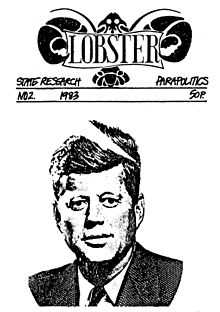Lobster (magazine)

Cover of Lobster 's second issue, 1983
|
|
| Editor | Robin Ramsay |
|---|---|
| Frequency | Biannual |
| Format | A5 (issues 1-9) A4 (issues 10-57) A4 PDF Online (issue 58+) |
| Circulation | ~1200 (1993) 1300 (2007) |
| Publisher | Lobster |
| Founder |
Robin Ramsay Stephen Dorril |
| First issue | 1983 |
| Website | www |
| ISSN | 0964-0436 |
Lobster is a magazine that is interested primarily in the influence of intelligence and security services on politics and world trade, what it calls "deep politics" or "parapolitics". It combines the examination of conspiracy theories and contemporary history.Lobster is edited and published in the United Kingdom and has appeared twice a year for 33 years, at first in 16-page A5 format, then as an A4 magazine. Operating on a shoestring, its distinguished contributors include academics and others. Since 2009 it is distributed as a free downloadable PDF document.
According to the Hull Daily Mail, Lobster 'investigates government conspiracies, state espionage and the secret service.' In 1986 the magazine scooped mainstream media by uncovering the secret Clockwork Orange operation, implicated in trying to destabilise the British government. Colin Wallace, a former British Army Intelligence Corps officer in Northern Ireland, described how he had been instructed to smear leading UK politicians. Questions were asked in the House of Commons and an extended scandal ensued.
The current curator of the CIA Historical Intelligence Collection, Hayden B. Peake, notes that the editors of Lobster see it as "member of the international brotherhood of parapolitics mags," the other members being Geheim (Cologne, Germany), Intelligence Newsletter (Paris, France), and Covert Action Information Bulletin (USA), and is "distinctive in its depth of coverage, its detailed documentation, and the absence of the rhetoric".
In 1989, Lobster published names of 1,500 citizens said to be working in intelligence. The magazine was denounced in the House of Commons. The editors replied that all published details could be found in local libraries. The magazine has also carried detailed analysis of "fringe" subjects such as UFOs and remote viewing.
...
Wikipedia
